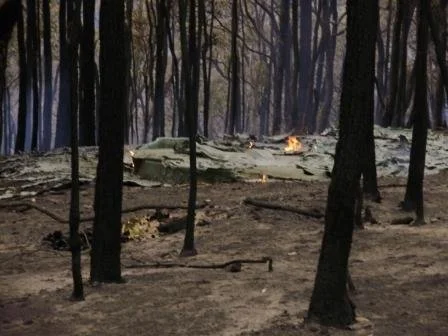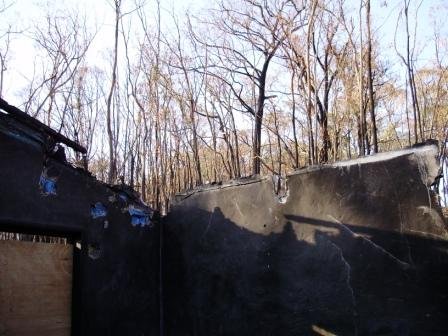Janet Meade
Bushfire Survivor, Christmas Hills, Victoria
My name is Janet Meade and I live in Christmas Hills.
We were fortunate in some ways on Black Saturday – our house burnt, but did not burn down. Unlike many others we got to decide whether things were too damaged to keep. An item of sentimental value retains that value, even when it is blackened by soot.
It is the impact on the community that lingers after the fires. Although spared the trauma faced by others I still, ten years later, find myself thinking, “What’s the point, it’s all just going to burn again.”
The fires brought out the best and the worst in the community. The best was the way that people worked together to help each other. Within 24 hours people in the community had found us temporary accommodation, while others emptied their linen cupboards to help us. The worst was the tension and passionate disagreement among the community in the months that followed. As in any situation, the most fragile members of a community are the ones who struggle the most to recover.
The human suffering caused by the fires is hard to quantify. In the weeks after Black Saturday our community was on edge, obsessively seeking weather reports to know which way the wind was blowing and whether they were in danger from the fires that continued to flare up. The stress and anxiety of repeated evacuations and the sound of sirens affected every-one – those who lost loved ones or property were not the only ones who suffered. I can no longer see news reports of distant climate disasters without a pang in my heart as I feel for those poor people, knowing what I now do about the trauma they are going through.
What I learned from the experience overall, however, is that when people choose to work together they can achieve amazing things. This gives me hope for the future.
Severe fires are only one of the natural events which are becoming more frequent and devastating. Around the world we are seeing more and more extreme weather events. These are only the most visible effects of climate change. The impact on agriculture is already evident – if it continues we are in real trouble.
Many politicians continue to deny the man-made disaster that has been recognised by science for over thirty years. We have to hope that we have not yet reached the “tipping point”, beyond which any efforts to heal our world will not be effective.
Our politicians must act now if they wish to save the future for our children and grandchildren. Corporations who have profited from destroying the environment that balances our climate, must be held to account. Money is not as important as a viable ecosystem.
Politicians fear asking people to make the changes that will save us – I ask them not to under-estimate the intelligence of their constituents. Many will complain, but most will understand. And when people work together to fight a threat they are powerful.


